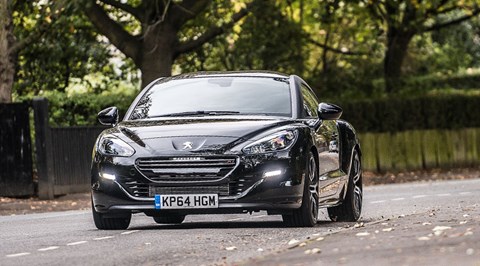► We live with a Peugeot RCZ R for 8 months
► A raw return to form by Peugeot Sport
► This or a used Porsche Cayman?
Month 8 running a Peugeot RCZ R: the conclusion of our long-term test review
Got a car with performance-orientated suspension? Planning a trip to the throwback idyll that is the Isle of Wight? Then pack a mouthguard – or at least a cushion. Jeez, are the roads ever bumpy. The RCZ R isn’t exactly the most supple of rides, but there were moments when I thought it was broken. Even my girlfriend, who adores this Peugeot to the point where she’ll forgive it nearly anything – including the sat-nav – found it hard going. Or maybe that was my driving.
For if our time together has shown anything, it’s that the R always encourages you to make the most of any open stretch of tarmac. The uprated 1.6-litre engine is a David from which many a Goliath has experienced an unexpected pasting. Particularly on the exit of roundabouts – where the Pug’s explosive mid-range and ridiculous front-end conviction mean it takes something mighty to out-monster it from turn indicator to the legal limit. The fixed rear spoiler, the 19s and the R badges aren’t bluffing: Peugeot Sport’s first road car is a giant killer.
‘Explosive’ is perhaps a bit of a misnomer. There are many remarkable things about the R’s unlikely combination of 1598cc and 266bhp – including that Peugeot was able to procure bolts strong enough to hold it all together, and the heat management preventing it from melting into a pile of mixed metals and hoses. The engine surely runs hot. Watching it steam away in the rain in traffic, you would swear egg-frying is a realistic possibility if the bonnet wasn’t so curvaceous; yet the water temperature gauge never budges.
But most remarkable is that in spite of massive turbocharging, the boost doesn’t arrive in one sudden dollop. Rather it swells with the kind of raging determination that tends to sneak up on you, not slap you around the chops – culminating in an inevitable yelp when you clock what speed you are actually going. True, the engine will overwhelm the front wheels in extremes of right-pedal brutality, yet the limited-slip diff turns most corners into an exercise in keeping your foot in – power-on grip is prodigious, only snow (or low tyre pressures) providing a reason for serious circumspection. The Audi TT ain’t got nothing on the Peugeot’s chutzpah and involvement.
What the TT does have, however, is premium brand power and a show-stopping interior. While I’d argue Audi has taken some backwards steps inside the most recent version, the cockpit is the element of the R that’s received the most stick around the CAR offices – a little red stitching does not counterbalance a surplus of tiny switches on a centre console that always seems just out of reach. Many praised the Peugeot Sport seats, though. Until the driver’s side started squeaking, something I never quite got around to asking the local dealership about.
The only issues we otherwise experienced were a curiously vocal fuel-pump (replaced under warranty) and the mysterious scuff that appeared on the front bumper. Or, this was the case until I managed to kerb one of the alloys on a particularly vindictive Cambridge car park last Sunday. The self-flagellation continues. In far better news, the British-made Alcon Racing front brakes proved utterly unflappable, and the RCZ’s voluptuous form drew admiring glances from the first to the last – although maybe that’s partially down to its scarcity.
This might also explain the used values. Our R was £33,880 when new, including £520 Nera Black paint and £1360 carbonfibre roof. You’ll now pay just over £22k at a dealer – that’s £10,000 in depreciation after only 7000 miles. Great if you’re after a nearly new bargain, but if you bought brand spanking I suggest you simply keep it; few other current cars can be so assured of future classic status.
It seemed fitting to give it a proper send off – hence the Isle of Wight. Lumpy road surfaces aside, the R seemed to enjoy the seaside air as much as we did, and it was with heavy hearts that we boarded the ferry, knowing it was literally the last time we would all be sailing off into the sunset.
By CJ Hubbard
Month 7 running a Peugeot RCZ R: the details, in pictures
The RCZ R’s beauty is more than skin deep. Some of the details are rather lovely. And some of them aren’t.
Ergonomics and interfaces aren’t ideal:
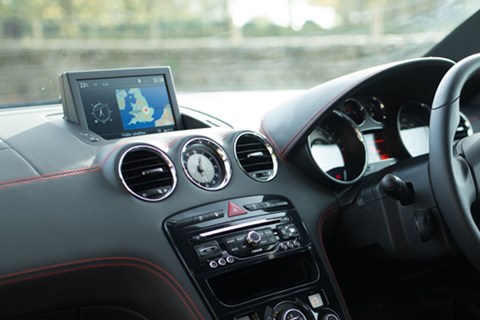
The lack of standard DAB radio has turned me into someone who shouts at Radio 4 in the morning, while the sat-nav not only features graphics from an Atari ST, it also makes some extraordinary routing decisions. Do not like. On top of which, the buttons are so far away you wonder if Peugeot’s interior designers have extendable fingers.
The bumper is better, the seat still squeaks:
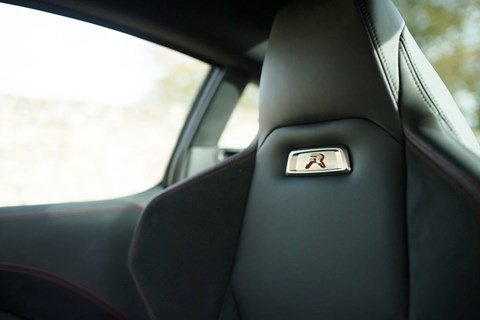
The front bumper is now good as new again, repainted after a mysterious miscreant scuffed it and ran away. The whining noise has also been sorted – a faulty fuel pump, replaced under warranty. Sadly, without this as a distraction, the squeak from the driver’s seat is now far more noticeable. Time for another trip to the dealer, perhaps?
Odd knob, but it does the job:
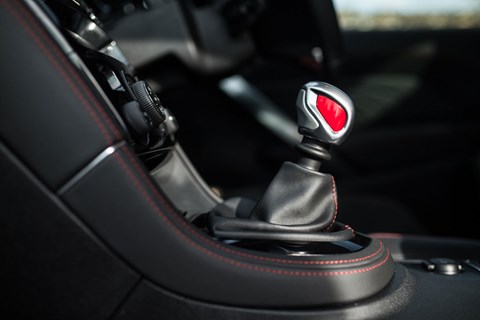
The RCZ R’s gearknob is a curious thing – it looks almost alarmingly, intimately, bionic. A metallic exoskeleton over a resin-like core, with a soft leatherish finish to the leading edge, it feels so good in the palm I occasionally catch myself stroking it in traffic. Don’t judge; the taut linkage betwixt it and the six-speed ‘box is also a joy.
Carbonfibre curves of desire:
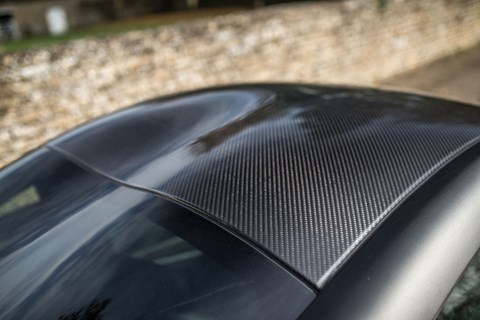
If the gearknob looks overtly masculine, the RCZ’s signature double-bubble roof balances the genders with a set of curves that couldn’t be more alluring. This is the element of the car that focuses most casual observers’ attention. The optional real carbonfibre finish is £1360 well spent, but expect plenty of wandering fingerprints.
By CJ Hubbard
Peugeot RCZ diary notes: Ben Whitworth borrows it for a month
In a ploy to try and wean me off my Caterham 160 and prepare me for life after the Seven’s departure, CJ Hubbard suggested I borrow his Peugeot for a bit. A very powerful front-drive coupe is about as far away as you could get from a balsa-light rear-drive roadster. About the only thing they have in common are blown engines and two doors. Oh wait… the Seven doesn’t even have doors.
I’ll be frank – I loathed the Peugeot for the first few days. It felt colossal and thick-ankled, inert and leaden. The steering wheel writhed and wriggled under acceleration. The front diff kept swerving me offline when powering through corners. The kept seating position made me feel like I was perched on a lifesaver’s laddered chair. The engine’s soundtrack was either drone or rasp. Visibility was appalling. Fuel economy was terrifying. So I gave it another week, ditched my innate subjectivity and tried hard to adopt a balanced approach. Here’s what I have scribbled into the back of the Peugeot’s logbook, a mini road test:
The styling From some angles, the Peugeot looks terrific – muscular, snouty and aggressive – but from others it looks decidedly awkward, dumpy and under-tyred. There are some lovely touches, like the beautiful weave in the carbonfibre roof, and the way its double-bubble profile is picked up by the rear screen. But then you look at the sweeping roof arches and wonder why they decided to undo this expensive exoticness by covering them in horribly cheap matt plastic…
The cabin After almost a year in the Caterham, getting into the Peugeot was a revelation. For a start it had doors. Doors with windows, no less! A leather-wrapped dashboard, climate control, windscreen wipers that worked, a pumping Bluetooth radio that synced with my phone… I felt like a thirsty Oliver Reed winning a drink-all-you-can competition. But – and you guessed there was a but coming – there was a price to pay for these goodies. Those massive A-pillars seriously hinder cornering visibility, forcing you into a weird mid-corner head bobbing-action to see round them. At junctions they could hide an articulated truck, let alone a motorbiker or cyclist. The ergonomics drove me mad. The pop-up sat-nav screen is so far away you need ET’s finger to operate it, and the centre console and chronograph-like instruments look like they were designed by two different design studios. No matter how I adjusted the chunky steering wheel and heavily bolstered seat, I couldn’t seem to get comfortable. I think it has to do with the positioning and angle of the pedals. Pity, because the accelerator and brake pedals are perfectly spaced for rolling your foot off one and onto the other.
On the road I was surprised by how intrusive the torque steer is in first, second and third. On anything less than smooth and straight blacktop, the front wheels would jerk the car’s nose all over the shop. Unsurprising when the blown 1598cc engine’s hefty 243lb ft drops its bomb at 1900rpm, but disconcerting, even when you know it’s going to happen. It’s a corking powerplant, though: rev-happy, muscular and mustard keen, and matched by the brilliant brakes and the long but mechanically precise throw of the gearlever.
The Peugeot Sport diff I quickly got my head around the diff-enhanced cornering dynamics. You have to get the car hooked into the corner right from the off, and let the mechanical diff keep the nose tucked tightly into the apex. Take full advantage of it and the Peugeot can be hustled across the scenery at a terrific pace. And while it is a fast car, it never feels holy-crap fast, deceptively camouflaging its pace with surprising refinement and – here’s the bad bit – a disappointingly soft and fluffy throttle response.
Ride quality What isn’t soft is the ride quality. After the Seven’s compliancy, the abrupt harshness of the Peugeot’s suspension set-up was a bit of a shock. I know it’s fitted with trick dampers, tweaked geometry and wider tracks that probably shine on the track, but my commute to work is along scarred and acned West Sussex roads with off-camber corners and patchwork surfacing. On these roads the RCZ R ride quality feels out of sorts. It’s way too stiff for fast and relaxed cruising, and when you amp it up a bit, that lack of compliancy means the car crashes and bashes from one intrusion to the next. So you either grit your teeth and get your chiropractor on speed-dial, or you back off.
Verdict After a month in the Peugeot, I couldn’t help thinking what a superb car it would be if it was rear-wheel drive. It would allow you to fully exploit its lovely engine and rid the steering of its torque corruption. Dial back the suspension, sharpen the throttle and you’d have a truly compelling dynamic package. But that’s a bit like wishing the Porsche 911 GT3 was £18k, carried four in comfort and returned 45mpg. It’s never going to happen. Which means I’m not ever going to want an RCZ R in my garage. For £32k, I’d take a nearly new Cayman. Or a Caterham Seven 160, with £10k in my pocket…
By Ben Whitworth
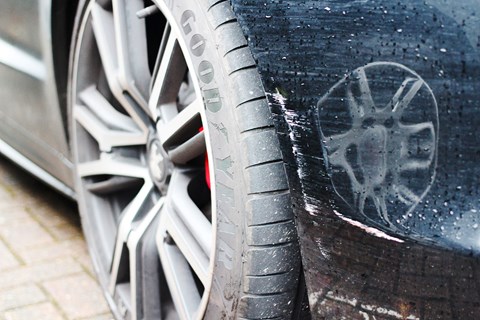
Month 6 running a Peugeot RCZ R: our Pug gets a flattened nose
Things you don’t want to see on an email from the office: Do you know about the damage to your RCZ? Er, no. I don’t actually. What? Sadly it seems that at some point between the Peugeot’s keys leaving my hands and me receiving the dreaded email – about four days – someone driving something red has been appreciating the R’s front bumper a little too closely. Happens, I guess, although it wouldn’t have killed the culprit to own up rather than just running away. The RCZ is away getting repaired (and having a whining noise investigated) now. I miss it.
By CJ Hubbard
Month 5 running a Peugeot RCZ R: which is the best driver’s car – the R or the 208 GTi 30th?
Could the RCZ R be the best car Peugeot has ever made? Depends on how you define ‘best’, I suppose, and I’m saddened to admit I’ve never driven a 205 GTi. But a special edition version of the 208 GTi, built to celebrate 30 years of that previous French fancy, has recently crossed my path. Looks a little bit cake-like itself, with that two-tone ‘Coupe Franche’ paint job.
The 208 GTi 30th and the RCZ R are currently the only road-going Peugeots to advertise the involvement of the Peugeot Sport race department. And by advertise, I mean the words ‘Peugeot Sport’ are actually written on the door sill scuff protectors and the front brake calipers (though these are, in fact, made by Brembo). As a current RCZ R custodian, I was really intrigued to see how the two would compare. Especially given the homage to legend of the smaller car. If anything is going to unseat the R as the Peugeot of the moment, it’s surely this jumped-up little shopping cart.
A quick blat round the local B-roads didn’t seem quite the ticket, and with the American adventure at the end of last year (CAR, February 2015) having left me with a habitual hankering for roadside burgers in sympathetic places, thoughts turned to London’s Ace Cafe and its nocturnal gearhead proclivities. And what do you know, the 208’s week-long visit just happened to coincide with the monthly French Classic and Performance night. No brainer, right? Our James had never been to the Ace before, so he volunteered as second driver and I handed him the keys to the RCZ for the trip down from Peterborough to London’s old North Circular, where the Ace has been situated – in various guises – since 1938.
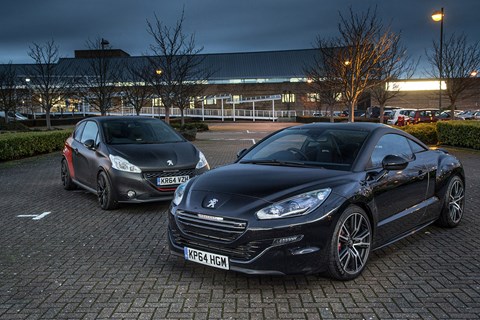
Immediate impressions of the 208 aren’t so good. Compared to the low-slung, c-o-g depth charge that is Peugeot’s funkily cab-forward coupe, the GTi feels too tall and roly-poly – despite the beefed-up suspension and widened track of the 30th. The steering and, in particular, the gearshift also seem fragile and flimsy in the supermini, a surprise given how meaty and mechanical they are in the R. Please don’t tell me Peugeot has fluffed this up. I remind myself the two cars are not only very different pieces of machinery, they are also some £10,000 and 61bhp apart. And, as ever, that it’s best not to jump straight to conclusions.
Yes, the 208 feels tall and, yes, it is most definitely daft to look at, but once you’ve adjusted the little grey cells for that it begins to show more of the R’s fighting spirit. Leading the way is the 30th’s proper limited-slip differential, the exact same torque-sensing Torsen unit that’s fitted to the front axle of the RCZ. Add in the darty directness of the tiny steering wheel, and corners are playtime. Even if those corners are roundabouts in rush hour. The cut and thrust of London traffic means you miss the RCZ’s extra oomph less, too, as the 205bhp 1.6 THP in the 208 is still mighty in the mid-range.
After grabbing a burger and admiring some gnarly old Clios (there wasn’t a massive turn out, to be honest), James drives it back, and declares it everything he’d hoped the standard 208 GTi would be. I’m not quite so smitten, but it’s hard to ignore the much-improved infotainment system and just how well Peugeot Sport has judged the 208’s ride – firm but far more forgiving than the RCZ’s, it deals with torn-up tarmac very capably. But somehow it still feels like a toy, while the R has the air of a true future classic.
By CJ Hubbard
Click here to read CAR’s Peugeot 208 GTi 30th review.

Month 4 running a Peugeot RCZ R: how practical is the RCZ?
Driving home for Christmas? Not quite. This lot represents the kind gifts to my parents on the occasion of their 40th wedding anniversary. The problem with springing a surprise party being the olds turning up in a car with no luggage capacity whatsoever, which meant temporarily storing the booty in my flat until I was able to deliver it to them in the Peugeot.
Good job I was travelling solo, as the plants (which miraculously survived my custodianship) were never going to fit in the Peugeot’s shallow but otherwise generous rump. Is a full car a happy car? Well, everything made it from Hertfordshire to Dorset in one piece, so no complaints. The firm suspension means flat cornering, so I didn’t even come close to getting a branch in the face. Bonus.
Speaking of filling up, I’ve been experimenting with octane ratings. Sort of. Despite the ridiculousness of getting 266bhp from a 1.6, the filler flap suggests 95 Ron is perfectly acceptable – and by association that I’ve been throwing money away on 98 for no reason. Dropping the premium stuff doesn’t seem to make the car noticeably slower. But there does seem to be more of a swell towards the power peak, suggesting a slight reduction in the spread of torque yet making higher revs more of an event…
By CJ Hubbard
Month 3 running a Peugeot RCZ R: why the limited slip diff makes for brilliant handling
I finished last month’s report on the RCZ R with a mention of the mechanical limited-slip diff. I’m here today to tell you that it’s now making me nervous. I fear that it might just be lulling me into a false sense of security, and at some point soon I’m going to come massively unstuck. Because at the moment, even amidst the winter grimness, it is so remarkably unflappable that it’s as if this Peugeot doesn’t run on Goodyear Eagle F1 but a special rubber compound concocted by Loctite: the grip the front of this car generates in corners is phenomenal.
That said, as if condescending to ward off this unnerving impression of invulnerability, first-gear wheelspin is never far away and, if you really clod the throttle, straight-line torque steer is always a distinct probability – usually in the direction of the nearest cyclist. Sorry. Blame the big turbocharger under the bonnet. But the way the front end hooks up once you’re already committed to a turn is a little piece of magic every single time, and the faster you go the harder it hugs your chosen line. There’s nothing else currently on sale that combines this tarmac rally car dynamic with anything approaching true physical beauty. This is a coupe that behaves like the very best front-wheel-drive hot hatches, a disconnect that continues to delight.
And don’t just take my word for it; several other CAR staffers have been having a go in the Pug recently. Ben Miller, ditching his M3 for once, returned raving, while Tim and James have also been singing the R’s praises. Perhaps most importantly of all, my girlfriend adores both the way it looks and travelling in it, so much so she’s yet to offer even a whisper of complaint about the ride, which I’m personally beginning to find a little wearing on longer journeys. Firmly controlled with a tendency towards the abrupt is perhaps the fairest way to describe it.
The interior doesn’t generate quite such universal appreciation. Ben was definitely impressed, especially with the fancy R seats, and James likes the leather dash covering and all that red stitching (let’s not jump to any conclusions). But Tim is much less convinced, commenting that the quality is not a patch on premium rivals. For my part I like the detailing – the dial faces, the curiously compelling analogue clock – but am troubled by the slightly compromised ergonomics.
This includes those seats, unfortunately, as the unusual angular squab bolsters poke me right in the thighs. And since someone pointed out a creak from the driver’s side – something to do with the adjuster mechanism, I think – I can’t stop hearing it. There’s also an unusual high-pitched whine that’s most apparent at idle. I’m turning the stereo up for now, but some investigation may be required.
These are minor grumbles in the overall scheme of life with Peugeot’s most exotic offering. The performance, the handling and even the fuel economy are proving it a charming companion.
By CJ Hubbard
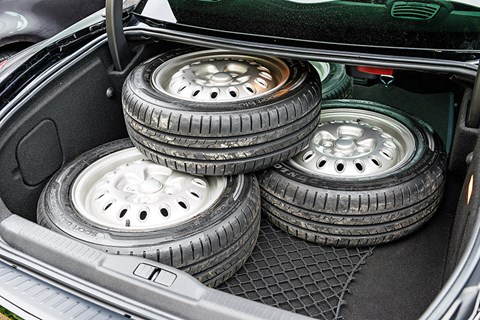
Month 2 running a Peugeot RCZ R: are those the rear seats?
The RCZ R had only just arrived last month, so we’re still getting to know each other. For all my amusement at the pain it’s going to cause CAR’s photographers, I absolutely love the black paint. Together with the R’s fixed rear wing and bodykit, it helps lend an air of subtle menace to a car some people round here feel is otherwise overly feminine.
There’s not much arguing about the RCZ’s pitiful excuse for a pair of rear seats, though. Not that I have a family to worry about. Instead I’m appreciating the way they fold flat to create a longer load floor – resulting in the Peugeot instantly being pressed into service as a parts carrier for my other car, a somewhat well used Mk1 Mazda MX-5. Bit of a squeeze, but you can get four refurbed 14-inch wheels with new tyres into the RCZ’s boot. And you thought it was impractical!
But the best thing about this Peugeot is driving it. Heavy turbocharging means the torque-sensing slippy diff has its work cut out as the weather turns wetter, but my god there’s satisfaction to be had giving it some stick. A delicious few months lie ahead.
By CJ Hubbard
Month 1 running a Peugeot RCZ R: the introduction
I don’t know. I’ve been at CAR six weeks and already I’m upsetting the photographers. But honestly, the unavoidable fact that this Peugeot RCZ R is hyper-reflective Nera Black is absolutely nothing to do with me: it was on its way to the magazine before I was. So this is two hellos, in a sense.
Turns out the paint is nothing to do with anyone else here, either, as my RCZ is not a press-fleet vehicle but an ex-marketing demonstrator. Which explains how it had already covered 344 miles when it turned up on the doorstep. Days of being on display and repeatedly polished presumably also account for the minor swirl marks it’s accumulated on some areas of the paintwork. What was that about black cars and high maintenance? I fear I’m about to find out.
Bugger. Seems I’m also instantly painting myself as something of a moaning Minnie, and I’m not at all – mostly (is this the time to point out that the RCZ doesn’t have DAB radio? Maybe later, then…). I’m actually massively excited to be running this car, which mixes the common or garden Peugeot image with a frisson of the spectacular and a substantial helping of genuine capability. Or possibly madness.
There are very few cars on sale that offer more bhp per litre than the R’s 266bhp 1.6-litre turbo. I’m writing this just three days after its arrival, so erring on the side of caution, haven’t exactly been making the most of it. But now I’ve had a quick flick through the manual and discovered no mention of any running-in period I’ll be correcting this oversight forthwith. Previous encounters suggest the official 5.9sec 0-62mph time hardly does the in-gear acceleration justice; I’m Teflon-coating my licence at the weekend.
Then there’s the chassis, thoroughly overhauled for the R by Peugeot Sport, in the racing arm’s first overt involvement with a production road car. That the Peugeot Sport team had a slightly different take on the way the RCZ should behave is obvious if you look at the details of the suspension changes. While the front springs are 10% stiffer, the rear springs are 44% stiffer, and though the rear anti-roll bar is thicker, the front anti-roll is slimmer. Thus a pronounced shift in balance, front to rear. This, plus all that power being delivered to the front wheels alone via a proper limited-slip differential, should prove highly entertaining as we move into winter.
Validating its status as the range-topper, standard kit includes satellite navigation, a leather-covered dash with red stitching, some fancy leather and alcantara seats, dual-zone climate control and enough automation that I haven’t yet had to touch the switches for the lights or the wipers. How terribly modern.
I don’t have much room left to talk about options, but that’s okay because the only extras fitted to this £32,000 Peugeot comprise the £520 metallic paint we’ve already covered and a glamorous £1360 carbonfibre roof – as if that provocative shape needed any more attention. With this and the accompanying matte black cant rails, it looks fit for Hotblack Desiato (look it up!).
I’ve also not had the best of starts with the RCZ’s sat-nav (the ‘fastest’ route from Gatwick to Cambridge is straight through London? Really?), which seems appropriate. It’s not getting hot in here, is it?
Stay tuned for more regular updates in this Peugeot RCZ R long-term test review blog here.
By CJ Hubbard
